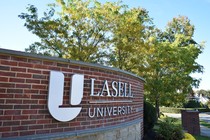
The Pandemic Is a Crisis for Students With Special Needs
Some students rely on schools for the personal, hands-on attention of specialists. What do they do now?

Some students rely on schools for the personal, hands-on attention of specialists. What do they do now?

The coronavirus pandemic is increasing academic gaps, and educators are scrambling to reduce them.

A veteran educator’s tips for reaching students remotely

Josephine Tatauq Bourdon, a 30-year veteran teacher, worked to bring Inupiaq culture to every part of her elementary school’s curriculum.

Outside the Ivy League, students who go home for the semester are at risk of leaving school for good.

We can get a sense of what to expect from Hong Kong, where students have already been out of school for more than a month.

Mitch Daniels has frozen Purdue’s tuition—at less than $10,000—for seven straight years.

The #MeToo movement has done little to challenge power dynamics in conservatories. Young musicians want to know why.

For 45 years, Deborah Roffman has let students’ curiosities guide her lessons on sexuality and relationships.

Tracy Murray’s kindergarten classroom in New York City has a unique approach to supporting students on the spectrum.

Controversies over minor changes show how invested parents are in the end-of-year school calendar.

In one Colorado county, solar-energy-training classes are helping ease the transition from fossil fuels to renewables.

The Hawaiian language nearly went extinct. Now it’s being taught in dozens of immersion schools.

I interviewed dozens of black mothers about how they help their kids navigate schools where they might be perceived as threats or made to feel unwelcome.

There’s no such thing as a dumb question.

A small Pennsylvania university has only one varsity program: e-sports. Is this the future of college athletics?

Some schools rent out their facilities, bringing in extra revenue during a time of widespread budgetary woes.

The annual cost of attending several selective universities is slated to reach $100,000 within a few years.

Thanks to parents’ donations, some public schools can afford shiny extras like coding classes, camping trips, and classroom iPads.

And start raising kind ones.